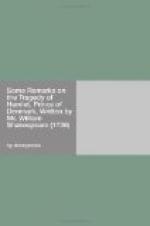Having brushed aside the “fantastick Rules” of the conventional critics, he proceeds to apply his laws of “Reason and Nature” as criteria by which to test the validity of Shakespeare’s effects and to discover the cause of these effects. The results he achieves are in part conditioned by his interpretation of his basic terms. Reason and Nature had been invoked by many previous critics; but to Anonymous these words are not what they were to Boileau and Pope. They particularly have nothing, or next to nothing, to do with the Deistic concept of a universal nature of external diversity but of an internal rational and universal order, which art reveals and to which art at its best conforms. To Anonymous, who in this is following the lead of the Hobbian school, the nature that is the norm by which Shakespeare is to be judged is merely human nature, used as Whately, Richardson, and Morgann are to use it later, and as Johnson uses it when he argues that there is an appeal open from custom to nature. Anonymous’ interest is in the way the mind works and the way people customarily act. So also when he talks about reason, he is thinking only of what is acceptable to a logical, healthy mind. He has no thought of identifying nature or reason with the traditional Rules or with Homer. On the contrary, he is willing to set both of them quite apart from, or even in opposition to the Rules (with a qualifying concession that they may sometimes meet), and he definitely renounces obligation to show that Shakespeare bears any relation to the ancients whatever, denying at the same time the value of the customary shows of learning in discussing his work. For Shakespeare apparently drew little from the authors of antiquity: “Nature was our great Poet’s Mistress; her alone has he followed as his Conductress.”
Such a view is emancipatory. Free the critic from the idea that nature and the ancients are the same and that reason and the laws ascribed to the ancients are identical, and he is ready to look at modern literature with an independent judgment and to see what it is like and what it is worth in and by itself. Release the critic from the necessity of regarding nature as universal order and reason as the directive of this order, and, whatever the loss in philosophic concept, he is ready for a more specific and particular investigation that turns its




